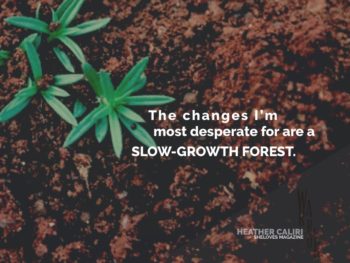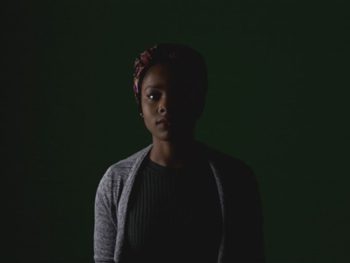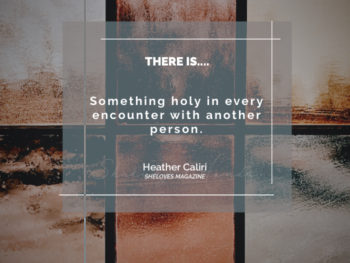
Sidle up to your best friend at church. Tell your husband when you have a minute alone. Admit it to your mom, to your small group, to your grown child.
Or, if all else fails, look in the mirror and say it to yourself.
I am not okay.
Tell the people you love why you feel broken. Admit that you’re scared, that your coping mechanisms have sharp edges. Break open your heart in plain view and trust someone to cradle it in their hands.
Maybe it’s the baby you lost, or the depression that came after you had a healthy birth. Maybe it’s marriage or finances or mental health. Maybe it’s something in your past, maybe it’s something coming in the future, maybe you don’t yet know why you’re falling apart.
Admit the truth: I am not okay.
You think that healing will come when you get your crap together. You assume other people are whole and strong. You assume there’s something about you that makes you this way. You assume that a normal person would be whole.
No.
We are all, every one of us, not-okay somehow.
Every. Last. One. Of. Us.
It’s not by papering over our sense of inadequacy that we heal. It’s by hunkering down in the middle of the mess and throwing up our hands that our hearts get nourished.
Where is your grief today? What emotion are you scared of facing? What is the truth you aren’t ready to say out loud? What do you think you’ve messed up, irrevocably?
Maybe, on paper, your issues look worse than other people’s. Maybe you have Honest-To-God labels that shame you, like bipolar or depressed or anxious; divorced, gay, female, doubter, control-freak, cynic.
Maybe you assume YOU are the problem.
You aren’t.
We think normal is a party everyone else was invited to. But even if you showed up there at some point, it’s not a celebration worth sticking around past midnight for. When you finally leave the noise and hubbub, the men in sharp ties, and the women in stiletto heels, you start gulping air.
You realize you hadn’t been breathing for a long time, because no one else mentioned pain, or grief, or bewilderment. You realized that others’ eyes were hard when they talked about how well they were doing. You realize they could not feel their own pain, much less comprehend yours.
Outside, in the inky black, your heart slows down.
In the darkness, you can hear the sound of crickets instead of the clatter of bored voices.
You realize you don’t want to be normal anymore. You don’t want to fit in the boxes people line up for you. You want to stop pretending that people and church and your past don’t hurt you. You want to tell your story without apologizing. You want to tell it and make it beautiful.
When you do, you find that normal or not, you are not alone.
When you leave the party where everyone is normal, you can decide who you want to be. You can decide, some days, that you are not okay, and you can rejoice on others that you are. You can start seeing that the not-okay days are mixed with the hugs of children and light filtered through trees, and the bright fire of sunset.
You see that being not-normal, not-okay brings the sharp brilliance of noticing and feeling and bearing witness into your life. It also means being tender, and vulnerable, and compassionate, and honest.
Outside, you find people in the glittering dark.. They’re not normal either, and they are relieved to catch your eye.
You greet one another with a holy kiss. You tell each other stories. You stay silent and unafraid. Sometimes, you sing.
And you realize, with a start, how much light there is outside in the dark: the bright brilliant stars, the calm changeable moon, and the light of God inside of you, making you shine.
Photo by Dino Reichmuth on Unsplash














 Move as if the hounds of hell are after you–for SheLoves Magazine
Move as if the hounds of hell are after you–for SheLoves Magazine
After years of being shameful about my depression, I finally decided to tell people close to me I feel crappy if they ask. The sexual abuse is a tricky one. You only tell people you absolutely feel safe with, which isn’t a lot of people.
But no one else has to live your life but you. It is very unfair and unnecessary to add to our burden by covering up our brokenness. It takes too much work and doesn’t add anything, nothing, to our healing. If people are uncomfortable that’s their problem.
If you really want to talk about being “Christian ” then not saying “I’m not ok” when you feel crappy is being dishonest and lying.
“You only tell people you absolutely feel safe with, which isn’t a lot of people.”
This is so important–thank you for underlining it. Honestly, I think it goes for other kinds of not-okayness, too, with lower stakes. I long for us all to cultivate relationships where we can say these hard things out loud, but you can get blowback if you’re wrong about who you can trust.
And amen to this: “if people are uncomfortable that’s their problem.” Yes. I’m trying to lean into not making myself responsible for managing and sanitizing others’ feelings. Let’s all get real and be whole.
Amen